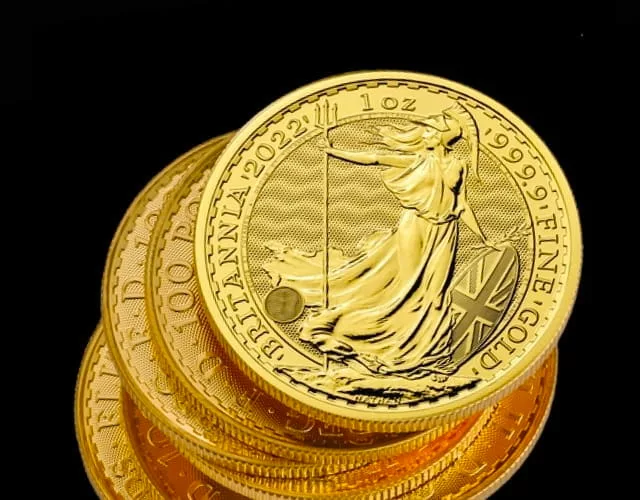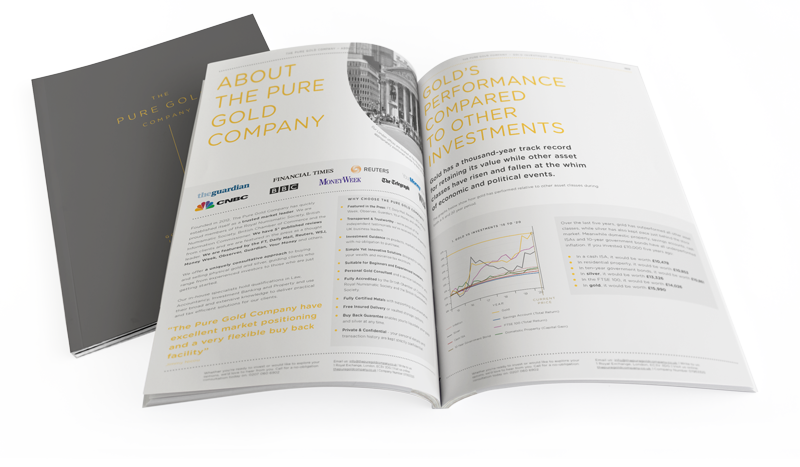At The Pure Gold Company, we specialise in helping our clients understand and navigate the gold investment world. In this blog post, we are focusing on some of the commonly asked questions to which our clients look to us for answers.
If you are researching investing in gold we hope these more detailed answers will help you. This is the second in a series of blog posts we are publishing to help investors better understand the world of physical gold investments.
Is gold going to rise because of the new recession?
The price of gold generally changes in inverse proportion to equities. When the value of equities plunges and remains depressed for some time in a recession, the price of gold usually rises. Sometimes this happens sharply as private investors and central banks purchase large quantities to hedge against the falling market.
The price of gold has consistently risen in response to major financial upsets in the present and recent past. During 2019, the political and economic ramifications of Brexit buoyed the gold price. This increase was compounded by the impact of the coronavirus pandemic. The average price of gold rose almost 40% in sterling terms in just the last two years.
From late 2007 to early 2013 – at the start of and during the global financial crisis and the great recession – the average price of gold rose 218% in just four years. In January of 1980 – during the early 1980s recession – the price of gold rose 52% in 19 days.
Predicting global economic recessions is notoriously difficult. As with any investment, past performance is not a sure indicator of future results.
Should I invest in gold before the next recession hits?
The Office for Budget Responsibility published UK GDP growth forecasts in November 2020 for the forthcoming five years. Even the best-case scenario doesn’t foresee a return to pre-Coronavirus GDP levels until 2022. The downside forecast saw a full recovery only by 2024. These forecasts were made before the conclusion of the second lockdown and emergence of the more virulent strain of the virus which plunged most of the country into further restrictive measures. It is clear the effect on the UK economy of the COVID-19 pandemic will be long and painful, and investors should be factoring this into their decision-making.
Recessions that depress the stock market tend to see a rise in gold prices. The bursting of the Dotcom bubble sent the markets on a long downward spiral, falling almost 50% in the months between early 2000 and late 2002. But during that time gold held its own, staving off the slump that besieged overvalued stocks and rising more than 10% in the period. The most recent financial crisis, which started with a bear market in 2007 and continued for two years, knocked 56% off the S&P 500 index, while the housing market also crashed on both sides of the Atlantic. But the gold price rose by a quarter in that time. It continued to rise for three more years as recession uncertainty and the fallout of the global financial crisis sent many investors looking for the safe-haven asset.
The price of gold is only one half of the equation to consider: the other is the safety of alternative investments. The last recession was the deepest since the Great Depression. During this, Britain witnessed its first run on a bank in more than a century, and the Government was forced to intervene to prevent the collapse of five British lenders. The FTSE 100 fell 5.3% in a single day, and an average of 22% over two years. It is far from clear whether investors’ money will be any safer in equities in the next recession than it was in the last.
Long-term financial forecasting – including predicting recessions – is not an exact science, and as with any investment, past performance is not a sure indicator of future results. It is for investors to judge whether the factors that raise the price of gold – political and financial instability, global upheaval, private and industrial demand – are likely to recur in the near future, recession or not.
Discover Gold’s Unique Tax Advantage
Most investments are subject to some form of taxation, but physical gold can be totally free of VAT and capital gains tax.

Does the price of gold always go up during a recession?
Gold has been a safe-haven asset for centuries, and this trait is a good indicator of its resilience in a recession. When other assets that are tied to the health of the economy come under pressure during the lean years, the immutability and innate value of gold comes into its own. That doesn’t mean gold only ever goes up during a recession. Depending on the length of the recession and the factors affecting the gold price, including inflation, currency value, demand and supply, there can be some fluctuations within the recessionary period. But in general, in recent history, the price of gold has maintained its value or outperformed other asset classes during times of economic instability.
The great recession of 2008 had very severe and long-lasting repercussions. Stock markets plunged at the height of the financial crisis while gold began to rise as the severity of the situation became evident and continued an ardent run, rising almost 200% in four years. The recession in the early 1980s prompted a spike in the gold price early on, and the Dotcom bubble burst of 2000 also saw gold on the rise as markets fell.
The economic devastation of the coronavirus outbreak, and the ensuing fall in GDP as well as the gloomy forecasts for recovery, have proved a fillip to the gold price, which rose 16% in 2020.
As with any investment, past performance is not a definitive indicator of future results. It is for investors to judge whether the fundamental forces that drove the price of gold up during past recessions will continue to do so in the next.


